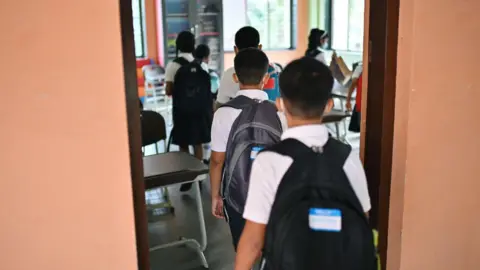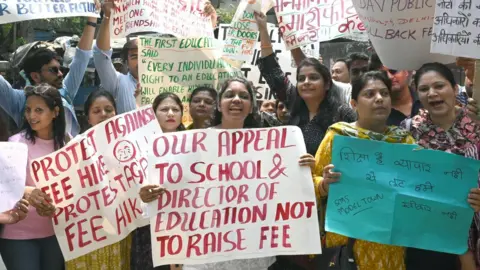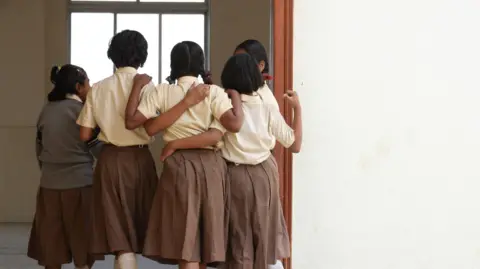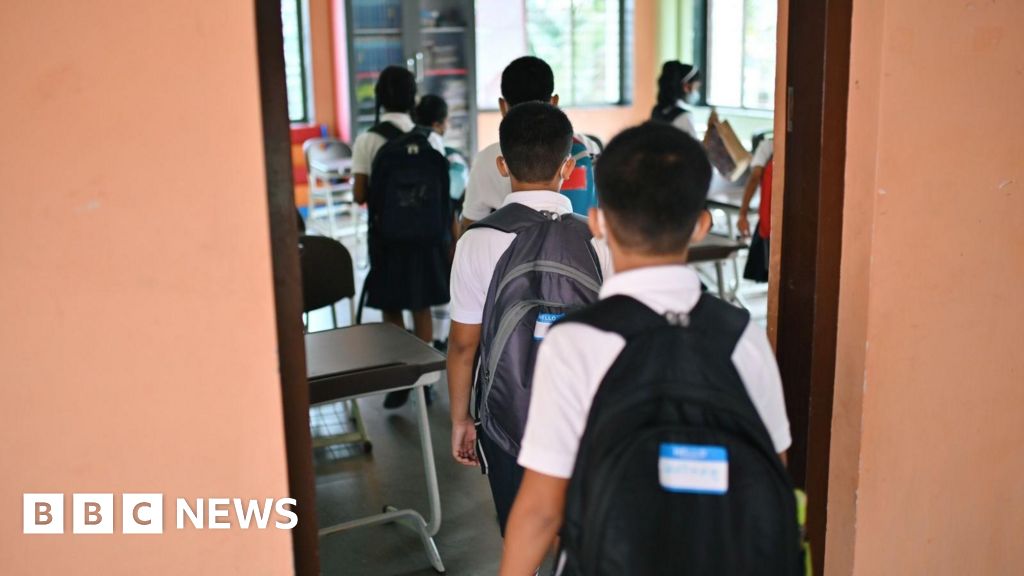BBC News, Delhi
 Getty Images
Getty ImagesParents in several Indian cities, including capital Delhi, are protesting against what they call “unsustainable” fee raises by private schools. These increases, they say, are stretching household budgets to a breaking point and taking a toll on their children.
Aaditya Mattey, 14, woke up on 9 May feeling confident about his English exam.
His father dropped him off at his school in Indian capital Delhi, but Aaditya never got to write his exam.
“Two or three minutes after I entered the class, guards and bouncers asked me to leave the room,” Aaditya recalls.
His father was still standing outside the school gates when Aaditya and a few other students were asked to get on the school bus, which dropped them off at their homes.
Aaditya’s name was removed from Delhi Public School Dwarka’s rolls after his father refused to pay a recent fee hike which he alleges was arbitrary and unauthorised.
The BBC reached out to DPS Dwarka and the Delhi Public School Society – which runs the DPS chain of schools – for comment, but did not receive a response.
Aaditya’s case is not an isolated one and DPS is not the only school which is facing allegations of arbitrary fee increase.
Over the past two months, protests have erupted across Indian cities – from Delhi to Pune to Hyderabad – as a growing number of parents accuse private schools of imposing steep fee raises.
In Delhi, which has emerged as the epicentre of the protests, the issue recently made headlines after DPS Dwarka allegedly confined students in the library, hired security guards to stop them from entering classes and expelled them over unpaid dues. Parents have accused the school of punishing children for financial decisions made by their families.
Government-run schools operate nationwide but often suffer from poor, inconsistent quality, prompting even many low-income families to choose private schools for better opportunities.
In Delhi, rules say that private schools on government-leased land must get Directorate of Education (DoE) approval before raising fees and must admit 25% economically weaker or disadvantaged students – a condition tied to their subsidised leases.
The BBC has contacted the DoE for comment on the fee rises, which parents have reported to us, but has not received a response.
Schools, on the other hand, have argued in court and told parents that they are struggling. They cite inflation, rising staff salaries, delayed reimbursements from the government for economically weaker students and the need for infrastructure upgrades as reasons for raising fees.
 Getty Images
Getty ImagesDivya Mattey says his son Aaditya’s annual fee in 2020 was 93,400 rupees ($1,077; £802). This, he says, has more than doubled to 189,096 rupees in 2025-26.
Mr Mattey is among dozens of parents who have taken the school to court, alleging it has unlawfully removed students from rolls and harassed families over the fee issue.
“We never thought a school of this stature would treat children like this – bar them from classrooms, assign bouncers and make them sit in the library for days,” he says.
The school did not answer the BBC’s questions over email and on a phone call. But in court, it reportedly argued that there was no legal obligation to retain students whose fees haven’t been paid. According to a report in The Indian Express newspaper, DPS claimed it suffered losses of 490m rupees last year and had to raise fees.
A notice on the school’s website meanwhile accuses “a small group of parents” of spreading “false and malicious information regarding the school fee structure” in an attempt to “mislead and create confusion”.
But the controversy reflects a broader problem.
A recent survey by online community platform LocalCircles found that more than 80% of parents with children in private schools said fees had increased by over 10% this academic year. In cities like Delhi, Mumbai and Bengaluru, the rise in some schools was as high as 30%.
India has no centralised regulation for private schools; each state sets its own rules.
For example, Maharashtra allows a 15% fee rise every two years – subject to review if 25% of parents object – while Karnataka permits a 10% annual increase with audit justification. Enforcement, however, is weak, and legal disputes over fees often drag on for years, providing little timely relief to families.
Gagandeep Singh, whose son attends Mira Model School in West Delhi, says fees rose 45% last year and another 7% this year.
Singh is willing to pay the earlier DoE-approved fee, but says the school has refused his cheque for the current term, which began nearly three months ago.
The BBC reached out to Mira Model School but received no response.
“It’s not our job to regulate schools,” Mr Singh says. “That’s what the government is supposed to do.”
Meanwhile, many parents fear that the DPS case has set a troubling precedent.
“We don’t want our children to be thrown out of their classes, like what happened there,” says Pankaj Gupta, whose son studies at Delhi’s Maharaja Agarsain Public School.
Mr Gupta said the school increased fees by 25% this year without advance notice.
“We had no choice. We had to pay,” he added.
Mr Gupta runs a small convenience store but has faced declining sales since the pandemic. The rise of online shopping has further squeezed physical stores. Now, rising school fees are pushing his family to the brink.
The BBC has reached out to Maharaja Agarsain Public School for comment.
 Getty Images
Getty ImagesAnother parent, who wanted to remain anonymous, said she’s considering withdrawing her son from the school he attended since childhood due to an “unsustainable” 30% fee hike this year.
“Both my husband and I work, but our salaries haven’t gone up significantly. As a parent, you try to give your child the best but sometimes that comes at great personal cost,” she said.
But she admits that switching schools also feels risky – what if the next one also increases fees?
“It’s the same situation everywhere,” she said.
The uproar has prompted the Delhi government to act.
On 10 June the state cabinet approved the Delhi School Education (Transparency in Fixation and Regulation of Fees) Ordinance, 2025, pending the Lieutenant Governor’s approval – necessary for it to become a law.
Though not yet public, Education Minister Ashish Sood says it will tighten private school fee regulations.
But parents are demanding greater transparency. Last weekend, hundreds protested in Delhi, urging the government to consider their feedback when drafting the bill.
Shikha Sharma Bagga, Supreme Court lawyer and secretary of a group called Justice for All, urges timely audits: “Schools’ finances must be audited before each academic year so parents know what they’re paying for.”
Back in Dwarka, Aaditya is still trying to get back to class.
Media reports say DPS Dwarka has agreed to reinstate students expelled for not paying fees. But Mr Mattey says they are still waiting.
“The school has shown some reciprocation, but to this date my child’s name is not back on the register,” he says, adding that he hasn’t received any assignments for the current academic session.
“My son is only 14. He should be focusing on his studies, not worrying about whether he’ll be allowed to sit in class tomorrow.”
Follow BBC News India on Instagram, YouTube, Twitter and Facebook.


